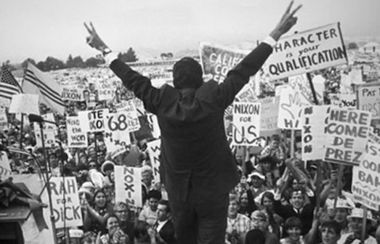Difference between revisions of "US/1968 Presidential election"
(Created page with "{{Event |image=1968 United States presidential election.jpg |image_width=380px |wikipedia=https://en.wikipedia.org/wiki/United_States_presidential_election,_1968 |start=8 Nove...") |
(Eugene McCarthy and the CIA) |
||
| (One intermediate revision by one other user not shown) | |||
| Line 8: | Line 8: | ||
}} | }} | ||
In the '''1968 United States presidential election''', the US public chose [[Richard Nixon]]. | In the '''1968 United States presidential election''', the US public chose [[Richard Nixon]]. | ||
| + | |||
| + | ==Democratic Party nomination== | ||
| + | The [[Democratic Party]] establishment preferred candidate [[Hubert Humphrey]]. Senator [[Eugene McCarthy]] ran as a peace candidate. Robert F. Kennedy entered the race late, leading to some resentment among the McCarthy staff. | ||
| + | |||
| + | "As the [[California]] campaign heated up, the Humphrey and McCarthy campaigns seemed to be collaborating to drive Kennedy out of the race. The ties between the two campaigns began to grow when a former [[CIA]] official name [[Thomas Finney]], who was close to Humphrey, took over as McCarthy's new campaign manager in the final weeks of the [[Oregon]] campaign. Finney's sudden appearance as McCarthy's campaign boss - and reports that Humphrey partisans had funneled $50,000 to McCarthy - drove some of the peace candidate's staff to resign in protest. It is possible that the CIA and the [[Democratic Party]] establishment were working to split the peace vote to hand the nomination to Humphrey."<ref name=Talbot>[[David Talbot]] ''Brothers, the Hidden History of the Kennedy Years'', page 360</ref> | ||
| + | |||
| + | "But McCarthy himself was surprisingly popular in CIA circles, where Kennedy was reviled and there was growing disaffection with [[Vietnam war|the war]], which some intelligence officials believed was damaging the country's national security interests. [[Dick Helms]], who advised [[President Johnson]] in a secret [[1967]] memo that the [[CIA]] believed he could withdraw from [[Vietnam]] without any permanent damage to the [[United States]], was one of McCarthy's sympathizers in the agency's upper ranks. Over the years - Helms wrote in his memoirs - he and the [[Minnesota]] senator 'lunched occasionally and encountered one another at the usual Washington events...McCarthy was always good company, intelligent and witty.'"<ref name=Talbot/> | ||
| + | |||
| + | ==Robert F. Kennedy/Assassination== | ||
| + | {{FA|Robert F. Kennedy/Assassination}} | ||
| + | Robert F. Kennedy hoped to become president and then use the [[US presidential]] authority to try to discover and expose [[JFK's killers]]. However, he was assassinated on June 5, 1968 just after winning the [[California]] primary elections. | ||
| + | |||
| + | |||
| + | |||
| + | |||
{{SMWDocs}} | {{SMWDocs}} | ||
==References== | ==References== | ||
{{reflist}} | {{reflist}} | ||
{{Stub}} | {{Stub}} | ||
Latest revision as of 22:37, 11 January 2023
 | |
| Date | 8 November 1968 |
|---|---|
In the 1968 United States presidential election, the US public chose Richard Nixon.
Democratic Party nomination
The Democratic Party establishment preferred candidate Hubert Humphrey. Senator Eugene McCarthy ran as a peace candidate. Robert F. Kennedy entered the race late, leading to some resentment among the McCarthy staff.
"As the California campaign heated up, the Humphrey and McCarthy campaigns seemed to be collaborating to drive Kennedy out of the race. The ties between the two campaigns began to grow when a former CIA official name Thomas Finney, who was close to Humphrey, took over as McCarthy's new campaign manager in the final weeks of the Oregon campaign. Finney's sudden appearance as McCarthy's campaign boss - and reports that Humphrey partisans had funneled $50,000 to McCarthy - drove some of the peace candidate's staff to resign in protest. It is possible that the CIA and the Democratic Party establishment were working to split the peace vote to hand the nomination to Humphrey."[1]
"But McCarthy himself was surprisingly popular in CIA circles, where Kennedy was reviled and there was growing disaffection with the war, which some intelligence officials believed was damaging the country's national security interests. Dick Helms, who advised President Johnson in a secret 1967 memo that the CIA believed he could withdraw from Vietnam without any permanent damage to the United States, was one of McCarthy's sympathizers in the agency's upper ranks. Over the years - Helms wrote in his memoirs - he and the Minnesota senator 'lunched occasionally and encountered one another at the usual Washington events...McCarthy was always good company, intelligent and witty.'"[1]
Robert F. Kennedy/Assassination
- Full article: Robert F. Kennedy/Assassination
- Full article: Robert F. Kennedy/Assassination
Robert F. Kennedy hoped to become president and then use the US presidential authority to try to discover and expose JFK's killers. However, he was assassinated on June 5, 1968 just after winning the California primary elections.
References
- ↑ a b David Talbot Brothers, the Hidden History of the Kennedy Years, page 360